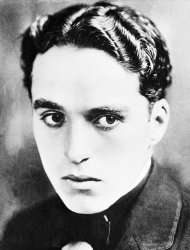
LONDON (AP) — They foiled plots and cracked Nazi codes, but Britain's spies were unable to solve the mystery of Charlie Chaplin's birth.
Although the entertainer is celebrated as one of London's most famous sons, newly declassified files reveal that Britain's MI5domestic intelligence service found no records to back up Chaplin's claim that he was born in the city on April 16, 1889.
Uncertainty about Chaplin's origins linger to this day — a mystery Chaplin himself may have helped to nurture.
The previously secret file, released Friday by Britain's National Archives, shows that MI5 investigated the silent film star in the 1950s at the request of U.S. authorities, who had long suspected him of communist sympathies. MI5 historian Christopher Andrew said the FBI's red-hating chief, J. Edgar Hoover, privately denounced Chaplin as "one of Hollywood's parlor Bolsheviks."
To the spies' surprise, there was no record of the performer's birth.
"It would seem that Chaplin was either not born in this country or that his name at birth was other than those mentioned," MI5 concluded.
Chaplin's life is a Dickensian rags-to-riches story. Raised in London in a family of music-hall entertainers, he moved to the United States in 1910 and became one of Hollywood's first megastars with his shabby, bowler-hatted everyman persona, the Little Tramp.
He was a box office sensation in movies such as "The Gold Rush," ''City Lights" and "The Kid," but his left-wing friends and activities alarmed the FBI, which began tracking the actor in the early 1920s.
In 1952, as fears of Soviet infiltration raged in the U.S., American authorities asked MI5 to investigate Chaplin's political allegiances and personal background, including a long-standing rumor that Charlie Chaplin was an alias and the performer's true name was Israel Thornstein.
But British spies could find no trace of him in the birth records at London's Somerset House under Chaplin, Thornstein or Harley, his mother's stage name.
The spies also checked French records amid rumors that he might have been born in the town of Fontainebleau — but that, too, drew a blank.
Elsewhere in the file, agents speculate that Chaplin might have Russian roots. There was an allegation that he had once spoken of "going back to Russia."
"This might refer to paying another visit, or it might denote his origin as Russia," noted senior MI5 officer W.M.T. Magan, speculating that Chaplin might have come from a Jewish family fleeing pogroms at the end of the 19th century.
Film historian Matthew Sweet said rumors about Chaplin's roots had been swirling well before the 1950s. The French claim stemmed from a fan magazine article from the 1910s that suggested Chaplin was born while his performer mother was on tour. The idea he was Jewish appears to have been an assumption by some fans that came to be widely believed. Chaplin did little to correct the record.
"The borderline between fact and fiction about celebrities was much less clearly policed than it is today," Sweet said.
MI5 seemed content to let the mystery of Chaplin's birth remain. British agents were skeptical of American claims that the star was a communist threat, with John Marriott, the head of MI5's counter-subversion branch, calling the U.S. allegations "unreliable."
"It is curious that we can find no record of Chaplin's birth, but I scarcely think that this is of any security significance," he wrote in 1952.
The U.S. thought differently and Chaplin was refused re-entry to the United States in 1952. He settled in Switzerland and lived there until his death in 1977.
The dossier shows MI5 continued to track Chaplin for several years. It contains newspaper clippings about the actor, snatches of conversation from suspected radicals who knew him and letters sent from Russia to "Comrade Charly Chaplin" via the communist magazine Challenge.
But by 1958, MI5 had concluded Chaplin was not a threat.
"We have no substantial information of our own against Chaplin, and we are not satisfied that there are reliable grounds for regarding him as a security risk," the agency noted. "It may be that Chaplin is a Communist sympathizer but on the information before us he would appear to be no more than a 'progressive' or radical."
Nonetheless, a taint of impropriety lingered. Files released in 2002 showed that the British government blocked a knighthood for Chaplin for nearly 20 years because of American concerns about his politics and private life — he was married four times, twice to 16-year-old girls. He eventually became Sir Charles Chaplin in March 1975, two years before his death at age 88.
Chaplin's origins remain cloudy, although the 1891 census records the then 2-year-old as living in south London with his mother and elder brother Sydney.
Evidence unearthed last year added another layer of mystery.
In a locked drawer of a bureau left behind after Chaplin's death, his family found a letter from a man in England named Jack Hill. It claimed Chaplin had been born "in a caravan (that) belonged to the Gypsy Queen, who was my auntie" in a Roma community near Birmingham in central England.
Chaplin had alluded to Roma roots in his autobiography, writing that "Grandma was half-Gypsy. This fact was the skeleton in our family cupboard."
Sweet said the letter was not proof of Chaplin's birthplace but evidence he cultivated the mystery of his origins.
"It is very widely accepted that he was born in London in 1889, but the piece of paper just isn't there," Sweet said.
"That letter is not proof that he was born in a Gypsy encampment. It is proof that he was terrifically attracted to the idea of that story, enough to keep the letter and lock it away and think of it as something important.
"The idea of the mystery of his own birth is something that he quite enjoyed, I think." LINK


